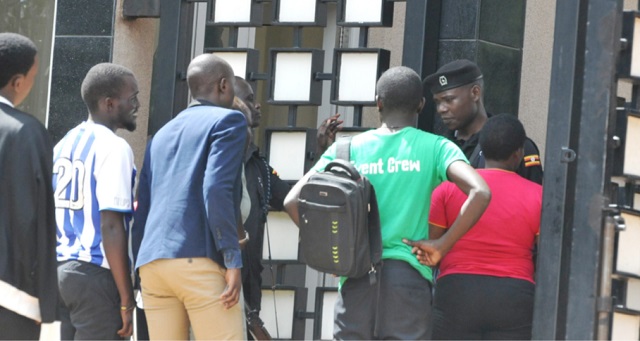
Increasing militancy
When in February he campaigned to become president of the Makerere University Students Guild, Julius Kateregga wore the red beret and overalls; colours of the People Power movement that is pushing to oust President Museveni from power.
When he emerged winner in March, his triumph was celebrated as defeat of the Museveni government which also backed a candidate in the race. Aware of strong opposition political sentiments, the government responded by increasing the military presence at Makerere University in April.
Columns of police and UPDF started routinely patrolling the campus allegedly to ensure security but also as a show of force. Whether intended or not, having the military and students so close sets the stage for sparks of tension to easily fly into political fireballs.
Then, on Oct. 22, the students went on strike – as they have done almost each year. But this time the government reaction was different.
On Oct. 24, starting at 7pm, the military swooped on Lumumba Hall, a male dormitory, believed to be the command centre of the strike. Under the cover of darkness, the military moved do-to-door broke down locked doors, battered residents, and vandalized property.
“The idea was to break down the morale of students,” one victim told The Independent. Many students fled but some disabled students were not so lucky and they were pounced upon and badly beaten. Over 30 students were arrested.
Earlier, on Oct.23 Julius Kateregga was arrested together with 30 other students for leading the strike.
By then barricades of car tyres set on fire by students were billowing black smoke on the edges of the university where private students’ hostels are located even as the military patrolled on foot and trucks; pouncing, arresting, and adding to the tense atmosphere.
It was the second day the security forces were ransacking the university campus in a hunt for the strike leaders; mainly members of the university students guild. Many students were beaten and some bundled onto waiting trucks and dumped in criminal cells at neighbouring police stations. But the worst was yet to come.
As white plumes of teargas fumes filled the air and gunshots rang out from a combined force of heavily armed police and the military combing the university and its neighbourhood for students, many Makerere University students who spoke to The Independent saw the arrest of Kateregga and others purely as a matter of a fight over an unfair tuition policy. They said the university, without consultation, increased their tuition fees by 15%.
But when The independent spoke about the arrest of students to lecturers and other observers, the discussion often went beyond tuition. Many spoke about money problems at Makerere University, but mainly seen as corruption in financial management, underfunding by the government, underpaying of lecturers, and unfair reliance on money paid by private students to run the university; the so called non-tax revenue.
Many others saw elements of politics. They saw the emergence of a People Power guild president at Makerere University to be at the centre of the current problems. But others pointed at the steely management style of the Vice Chancellor, Prof. Barnabas Nawangwe.
Having a People Power guild president at Makerere University is nothing usual. The NRM government also had a candidate allied to it, who emerged third because Makerere University has historically been a hotbed of anti-government political sentiment, and most student leaders come from opposition stock.
Kateregga, a 24-year old Bachelor of Education third year student identifies with the Uganda Young Democrats (UYD) of the Democratic Party (DP) but opted for the People Power badge as has been happening since Kyadondo East MP, Robert Ssentamu Kyagulanyi popularized it.
Another contestant identified with the leading opposition party, the Forum for Democratic Change (FDC) and many were “independent”. Some like David Musiri who called himself ‘Gen. Musiri’ also identified with People Power and adopted militaristic styles.
 The Independent Uganda: You get the Truth we Pay the Price
The Independent Uganda: You get the Truth we Pay the Price





